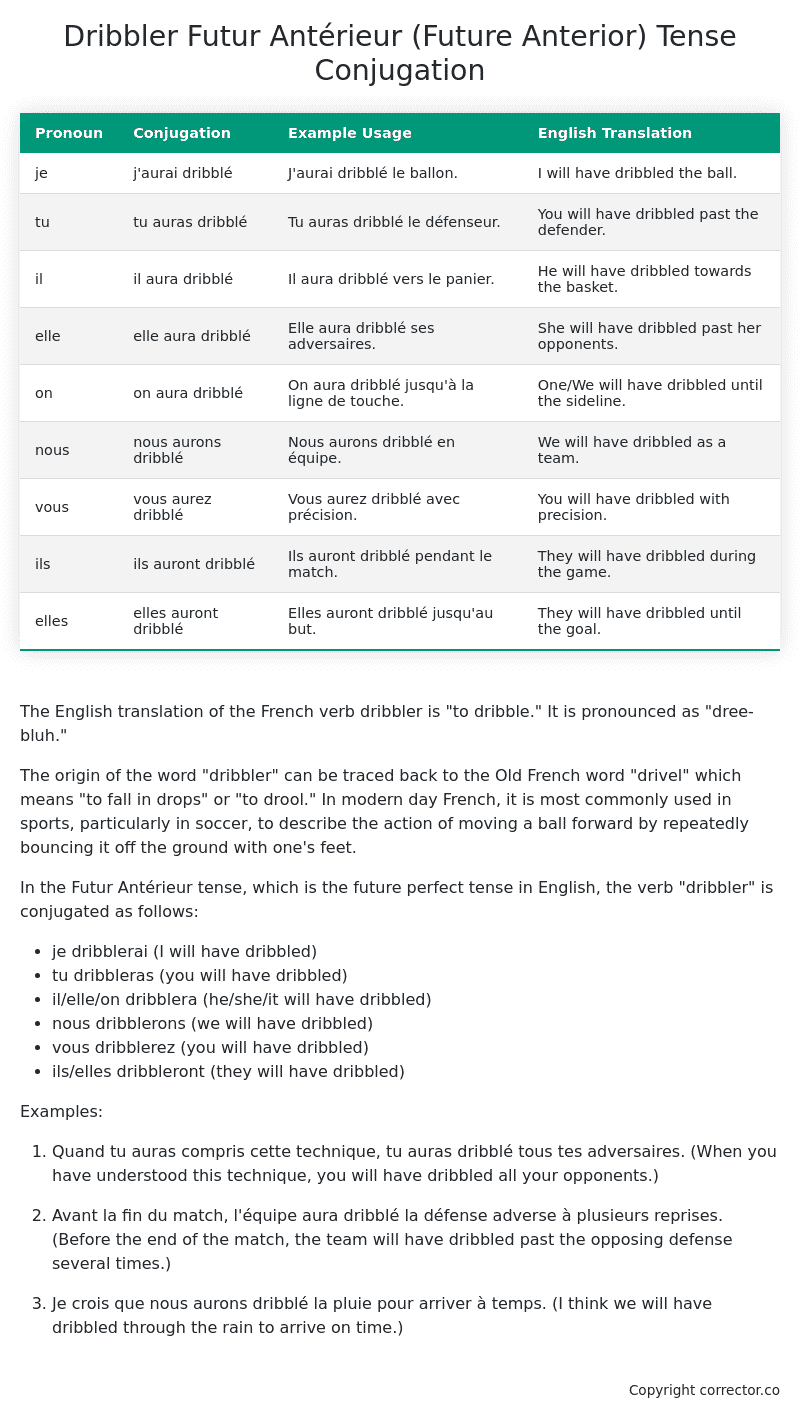Futur Antérieur (Future Anterior) Tense Conjugation of the French Verb dribbler
Introduction to the verb dribbler
The English translation of the French verb dribbler is “to dribble.” It is pronounced as “dree-bluh.”
The origin of the word “dribbler” can be traced back to the Old French word “drivel” which means “to fall in drops” or “to drool.” In modern day French, it is most commonly used in sports, particularly in soccer, to describe the action of moving a ball forward by repeatedly bouncing it off the ground with one’s feet.
In the Futur Antérieur tense, which is the future perfect tense in English, the verb “dribbler” is conjugated as follows:
- je dribblerai (I will have dribbled)
- tu dribbleras (you will have dribbled)
- il/elle/on dribblera (he/she/it will have dribbled)
- nous dribblerons (we will have dribbled)
- vous dribblerez (you will have dribbled)
- ils/elles dribbleront (they will have dribbled)
Examples:
-
Quand tu auras compris cette technique, tu auras dribblé tous tes adversaires. (When you have understood this technique, you will have dribbled all your opponents.)
-
Avant la fin du match, l’équipe aura dribblé la défense adverse à plusieurs reprises. (Before the end of the match, the team will have dribbled past the opposing defense several times.)
-
Je crois que nous aurons dribblé la pluie pour arriver à temps. (I think we will have dribbled through the rain to arrive on time.)
Table of the Futur Antérieur (Future Anterior) Tense Conjugation of dribbler
| Pronoun | Conjugation | Example Usage | English Translation |
|---|---|---|---|
| je | j’aurai dribblé | J’aurai dribblé le ballon. | I will have dribbled the ball. |
| tu | tu auras dribblé | Tu auras dribblé le défenseur. | You will have dribbled past the defender. |
| il | il aura dribblé | Il aura dribblé vers le panier. | He will have dribbled towards the basket. |
| elle | elle aura dribblé | Elle aura dribblé ses adversaires. | She will have dribbled past her opponents. |
| on | on aura dribblé | On aura dribblé jusqu’à la ligne de touche. | One/We will have dribbled until the sideline. |
| nous | nous aurons dribblé | Nous aurons dribblé en équipe. | We will have dribbled as a team. |
| vous | vous aurez dribblé | Vous aurez dribblé avec précision. | You will have dribbled with precision. |
| ils | ils auront dribblé | Ils auront dribblé pendant le match. | They will have dribbled during the game. |
| elles | elles auront dribblé | Elles auront dribblé jusqu’au but. | They will have dribbled until the goal. |
Other Conjugations for Dribbler.
Le Present (Present Tense) Conjugation of the French Verb dribbler
Imparfait (Imperfect) Tense Conjugation of the French Verb dribbler
Passé Simple (Simple Past) Tense Conjugation of the French Verb dribbler
Passé Composé (Present Perfect) Tense Conjugation of the French Verb dribbler
Futur Simple (Simple Future) Tense Conjugation of the French Verb dribbler
Futur Proche (Near Future) Tense Conjugation of the French Verb dribbler
Plus-que-parfait (Pluperfect) Tense Conjugation of the French Verb dribbler
Passé Antérieur (Past Anterior) Tense Conjugation of the French Verb dribbler
Futur Antérieur (Future Anterior) Tense Conjugation of the French Verb dribbler (this article)
Subjonctif Présent (Subjunctive Present) Tense Conjugation of the French Verb dribbler
Subjonctif Passé (Subjunctive Past) Tense Conjugation of the French Verb dribbler
Subjonctif Imparfait (Subjunctive Imperfect) Tense Conjugation of the French Verb dribbler
Subjonctif Plus-que-parfait (Subjunctive Pluperfect) Tense Conjugation of the French Verb dribbler
Conditionnel Présent (Conditional Present) Tense Conjugation of the French Verb dribbler
Conditionnel Passé (Conditional Past) Tense Conjugation of the French Verb dribbler
L’impératif Présent (Imperative Present) Tense Conjugation of the French Verb dribbler
L’infinitif Présent (Infinitive Present) Tense Conjugation of the French Verb dribbler
Struggling with French verbs or the language in general? Why not use our free French Grammar Checker – no registration required!
Get a FREE Download Study Sheet of this Conjugation 🔥
Simply right click the image below, click “save image” and get your free reference for the dribbler Futur Antérieur tense conjugation!

Dribbler – About the French Futur Antérieur (Future Anterior) Tense
Construction
Common Everyday Usage Patterns
Interactions with Other Tenses
For example
Summary
I hope you enjoyed this article on the verb dribbler. Still in a learning mood? Check out another TOTALLY random French verb conjugation!


